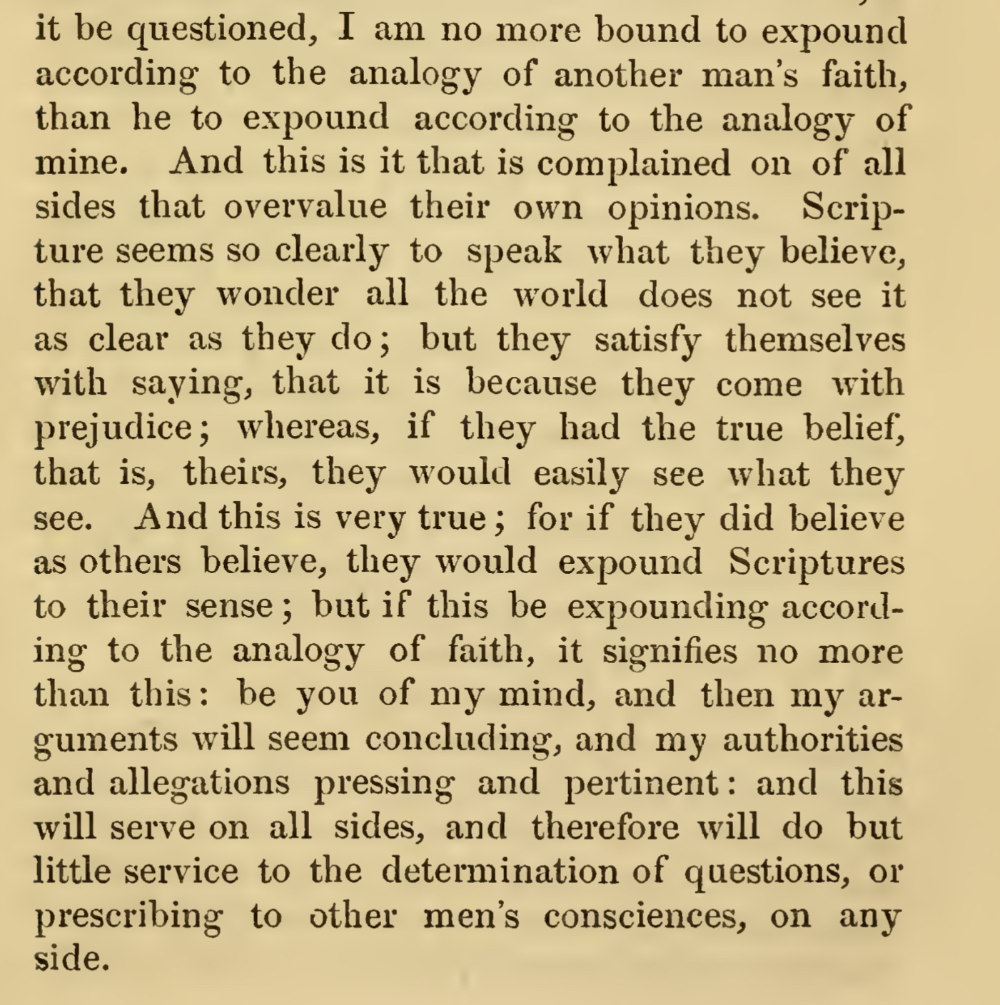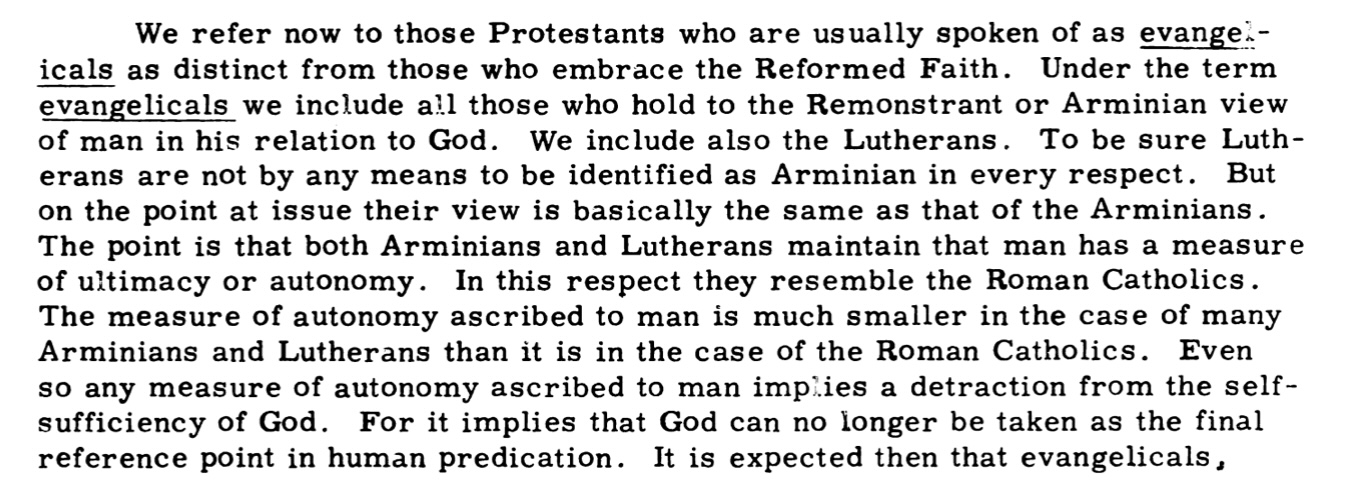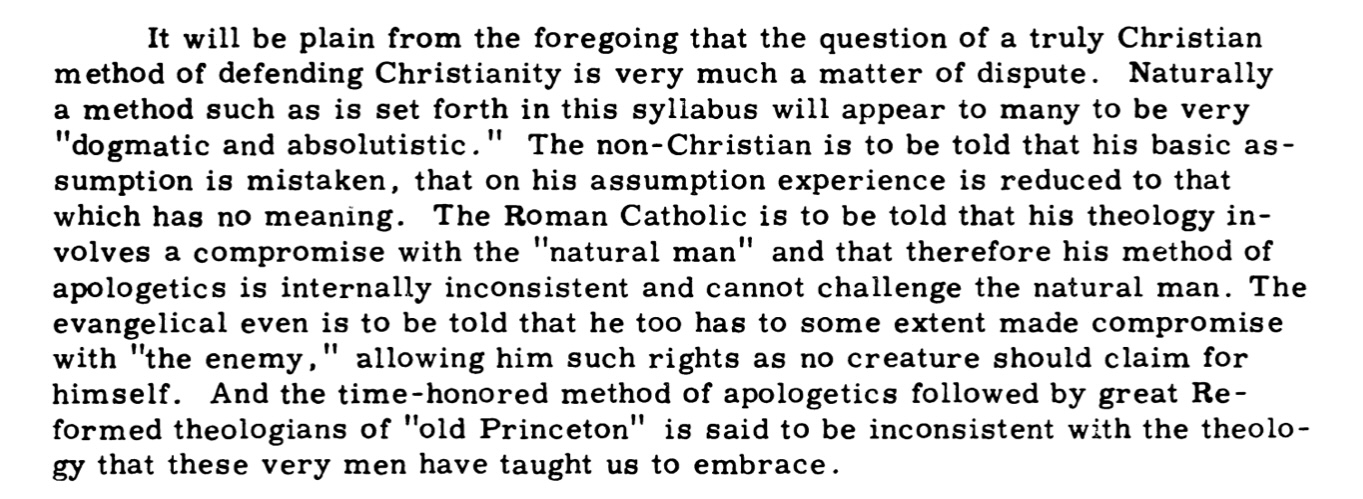
The Subtle Strategy of Theological Belligerence
Have you ever grown weary of the amount of intellectual and rhetorical effort required to engage in an argument from your opponent's point of view? Do you often think that it's unfair that other people have opinions that are different from yours? As we see from the writing of Jeremy Taylor people have been feeling these frustrations since at least the middle of the 17th century. But it wasn't until the middle of the 20th century that these urges for polemic dominance were codified into the formal theology of Presuppositionalism by the Reformed theologian extraordinaire, Cornelius Von Til. Since this desire for ideological dominance has burned within us for so long, perhaps it would be instructive to explore his reasoning.

Here we see laid out for us the bare bones of Presuppositionalism. In Von Til's apologetics, any engagement with reason or facts must start with an agreement by all involved that God is the final arbiter of those reasons and facts. Without this capitulation, the conversation cannot proceed. Note that it is not only the existence of God that is presupposed but the authority of God that must be recognized by all parties. It is such a simple hack that it makes you weep for the gallons of ink wasted in the effort to make theological connections with humanity by the likes of Augustine, Aquinas, or Lewis.

Presuppositionalism, put another way, is refusing to engage in a debate until your opponent agrees to agree with you. It is the theological equivalent of picking up your toys and going home if things aren't going your way. For Von Til, the Christian and the non-Christian are two separate creatures and there is no way for them to effectively communicate until the non-Christian agrees to take for granted the supreme authority of God as the final arbiter of all human knowledge and accomplishment. This means that Presuppositionalism is not just a theological instrument, but it must be applied to any and all questions that involve the human condition.

The expansion of this theological belligerence is not finished because it requires something else that must be presupposed, the absolute infallibility of Scripture. Meaning that if God is assumed to be self-explanatory then Scripture must be self-affirming and placed above any attempts to explain reality using reason or facts. Reformed theology, in this sense, places on Scripture the entire weight of being the infallible, final statement on all human knowledge and experience.

For Von Til, epistemology is a zero-sum equation. If humans are given any authoritative voice at all in their reality, then God cannot be said to have any, and vice versa. The goal of this theology is to deny humankind any modicum of self-determination because, in VonTill’s black-and-white world, it can only be all of one or the other. Any compromise on this point will bring the entire edifice crumbling to the ground.

To drive this point home, Van Til lays out the relationship between God and humans. Any human thought, progress, or knowledge gains validity only when filtered through, and validated by Scripture. Humans are deprived of creativity, altruism, convictions, and agency.

VonTill's misanthropic tirade goes even further. In his cosmology, humanity is not merely incapable of independent thought or action but is actively resistant to any form of positive progress. Humans are chaos agents who, if given free rein, would destroy everything. It is only by the restraining hand of God that human civilization can progress forward.
Why is it dangerous?

By denigrating the base utility of reason and logic, Von Til removes them as effective tools to guard against abuse. All power and authority rest in Scripture and is not to be questioned. Indeed, it cannot be questioned or the whole fragile edifice, once again, instantly shatters.
Presupositionalism places the Reformed Christian in an estranged, superior relationship to their fellow human. They alone have access to authority and information that exist outside of the natural human experience. This encourages the Reformed Christian to see non-Christians and other, Non-Reformed Christians, as a separate and inferior group to be contended with and denounced.


But what is the reality?
This argument against Presuppositionalism is not an argument against the power and inspiration of Scripture or the authority it has as the Word of God. Instead, this is an argument for a realistic view of our fallible, human capabilities to dogmatically know exactly how to read and apply the Scriptures. It is a cautionary warning to anyone who believes that they, or their group, has exclusive access to the "truth" and refuses to engage with other evidence or viewpoints that challenge their particular worldview.
To be sure, this overwhelming desire to be right is a human trait. It is not relegated to only one segment of the ideological spectrum. We all, to some degree or other, want to feel as if we have life figured out and are ordering our life according to principles of moral significance or at least pragmatic utilitarianism. This is not a call to moral relativism but instead is a call for us to realize the vast gulf that exists between God and humans. And even though the sweet beauty of the gospels is the fact that God crossed that divide for us. And while He brought us knowledge of His love and saving grace, He did not bring us the holy, perfect knowledge of all things. God alone can be completely sure in His knowledge and always pure in His motives and actions. This must engender in us a humility that acknowledges that there is nothing that we are more consistently wrong about than the fact that we are right - correct in thought and action.
It is this very fact that undercuts Presuppositionalism in particular, and this type of theology in general. It rests on unstable foundations because it is dependent for its validation on the very thing it denigrates, human will and cognition. The stark fact is that we humans have no other tools with which to build our understanding of the world around us. They are the tools that Van Til uses to develop his theology and write his thesis. This unveils the strange orriborus that is all theologies of this ilk. Every argument it builds with one hand about the worthlessness of human reasoning and agency, it is fated to tear down with the other hand by proving the opposite through their actions of writing and persuading.
Reformed theology of this nature seeks to replace the human will with a divine rule by fiat. A fiat that just so happens to be understood and enforced by other humans with some special knowledge, insight, or grace. It is a doctrine of misanthropy that applies to all but those in a specific group. It fosters an antagonistic antipathy for the very humans it purports to reach with the Gospel.
Yet, while we may properly feel frustration or even anger when reading Von Til's work, our emotions must be ameliorated by the recognition of Van Til's humanity. Beneath all of his theology, there is a deep human longing that we can identify with. In every paragraph of this work see can see a craving for a divine ruler, an all-powerful, active potentate who can answer every question, banish every doubt and punish every evil that plagues our human existence. He desperately wants the God of the Old Testament to return, a God wreathed in fire and smoke, a God who declares and chooses and smites.
But this is not reality. For whatever reason, God in His wisdom has chosen humans to be His ministers and entrusted us with the humbling task of being the bearers and interpreters of His Word. Whenever we are lured by this same desire for perfect knowledge and moral certainty we must blink ourselves awake and come to face that we ourselves are only humans living amongst other humans, working with the same fallible hands, minds, and morals as everyone else. Through this, we make space for compassion, grace, and sacrifice for others. Through this we meet our fellow humans on common ground, without preconditions, to let them know that their value to us and God is not tied to how much they agree with Him or us.

